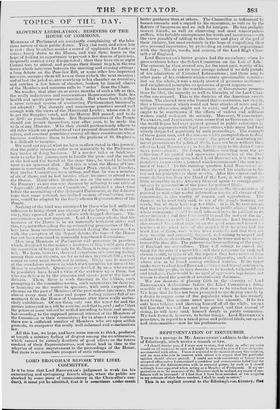TOPICS OF THE DAY.
SLOVENLY LEGISLATION; BUSINESS OF THE HOUSE OF COMMONS.
MEiniFits of Parliament are constantly complaining of the labo- rious nature of their public duties. They rise early and retire late
to rest : they breakfast amidst a crowd of applicants for flanks or votes; hurry down to the House, and wait three hours in the hope of finding an opportunity to present a few dozens of petitions, frequently coming away disappointed : then they have six or eight Commi tees to attend, and perhaps their dinner toget, in the two hours which intervene between the morning and evening sittings:
a long debate on the Poor-law Bill, or some other less important measure, occupies them till two or three o'clock the next morning; and at last t he jaded smatter crawls up to his chamber au troisieaw, and catches a few hours of slumber, broken by fancied cheers of the 'Members and sonorous calls to " order" from the Chair.
No wonder, that after six or seven months of such a life as this, the really industrious and conscientious Representative finds his health and spirits grievously impaired. But whose fault is it that a more rational system of conducting Parliamentary husineseis not adopted ? The slovenly and wearisome practices accord well enough with the views of the Ministerial Leader; whose cue it is
to get the Supplies voted, and the Mutiny Bill passed, and to do as link as possible besides. But Representatives of the People
should not permit themselves, year after year, to be made the tools of any Minister. Why they should pertinaciously adhere to old rules which are productive of vast personal discomfort to them- selves, and constant grumbling among all their constituents whose business condemns them to haunt the purlieus of St. Stephea's, it is difficult to imagine. We need not repeat what we haee so often stated in this journal, that the public interests suffer most materially by the Parliamen- tary modes of dating business. If a master tailor or bricklayer were to order his journto man to handle the goose and the needle or the hod and the trowel at the same time, he would be looked upon as an ignorant idiot. But this is what the House of Com-
mons is constantly doing. Sir liemEiti PEEL stated, on Tuesday, that twelve Committees were sitting, and that he was a member
of six of them, and he had besides ether business to attend to iu the House. Many other Members are in the same situation as Sir Rommv; as any one may discover by referring to our table of
" Impo.ssible Attendaece on ronimitires," published a shot t lime before the assembling of the Reformed Parliament, in the delusive hope that some rational, methodical system of contIncting busi- ness, would be adopted by the freely-chosen Representatives of the People.
Nothing of the kind was attempted by those who had sufficient influence to bring about any change for the better. On the con-
trary, they opposed all such efinns with do„ gel obstinacy. The consequences me now apparent. Lord A LT1101:1? admits that the business of the House is in an unusually back yard state: and this, too, notwithsteuding the speechmaking propensities of Mese hers have been meritoriously restrained during the sessim,—for, with the exeeptioa of the Repeal debate. the time of the House has not, been consumed in unusually lengthened discussions.
How long Members of Parliament will persevere in practices which, if applied to the wiliness bosiness of line, would gain them
the reputation of being fit only for 13e.11ain, it is imp to fore- tell. We have, however, observed symptoms of a groe Mg reeling among their constituents, as eir as relates to private h;it,, which sooner or later must break out in action. Every one is auneyed at the scandalous manner in which the Coat flit tee business of the House is conducted. Questions are decilled by taw, who cannot by possibility have heard a tithe of the evidence upsa them, but who arc driven in by the attoroies and agents just at the time of division. Then, there is such dunning in the lobbies, such prompting in the committee-rooms, such manoeuvres for delaying or hurrying on the matter in question, with such fiequent dis- closures on the part of Members of the profoundest ignorance, that almost every man of sense and proper feeling returns full of re- sentment from the House of Commons after these really melan- choly exhibitions. Of one thing only can the agent for and the, parties interested in a bill be certain; and that is, prole ',actor 1 chat the points at issue will not be settled according to their real merits, but according to the supposed personal interest of the Members of the Committee or their connexions; for in almost every instance there are a tullicient number of Members who act upon selfish grounds, to overpower the really well-informed and conscientious few.
All this has, we hope, and have some reason to think, produced at length a salutary feeling of disgust among the constituencies, which cannot be entirely destitute of good effects on the future conduct of their Representatives, and must lead in time to the adoption of some improvement in the proceedings of the House. But there is no immediate prospect of such reformation.






















 Previous page
Previous page